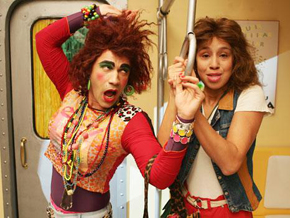An email in the middle of a Sunday afternoon made me think about what has made me laugh on some Saturday nights. In fact, I had already suspected my laughter, but I confess that after the aforementioned electronic message I became more thoughtful. The email read a statement from a woman saying that they were encouraging, via a humorous program, sexual abuse against working women, users of subways and trains in large cities.
The reference was, if you allow me, to our dear and adorable Janete and Valéria from "Zorra Total", especially when one of them says she is being "bullied" by a man and the other, before defending her, tries to convince her that she better take advantage of, because "she doesn't get to choose." It is worth remembering, without intending to defend the TV channel, that the email does not mention that the scene usually ends with the friend protecting the alleged victim.
The first time I came across these two characters I was surprised by what has been undeniable, the excellent performance by actors Thalita Carauta and Rodrigo Sant'Anna. Afterwards, still laughing, I kept thinking about some aspects that seem innovative to me in the laughable image of the effeminate and/or mounted in this painting compared to others already broadcast on Brazilian TV.
First, there is no hostile relationship between a female character and a character “dressed as a woman”. Despite the tensions in their relationships, there is a welcoming complicity between them, including affectionate gestures, amidst Valéria's mocking and impatient speeches ("the bunita!"). The fact that there is no competition and rivalry between the woman and, in the eyes of many viewers, "a man who calls himself a woman", the characters leave aside a lineage of other characters where this was unthinkable. The way they relate to each other does not give rise to interpretations that are still present in the common sense: that, deep down, effeminate, non-heterosexual men are always jealous of women.
There is also no control or violent restriction (if you prefer, homophobic) against the homo-oriented character, either by other characters or extras in the picture, or by a presenter loved by the public. Not even a police officer, a teacher, a doctor or any other representative of the State (public servant) appears on the scene to recriminate any performance of the one, according to herself, "who became a woman". And I don't think that's a small thing. Because, on a daily basis, this is not what happens. In the real world, anyone less discreet from the point of view of sexuality and gender knows what I'm talking about.
But what pleases me most is that seduction via bodies considered by the majority to be hot, young, beautiful and desired is not at stake in the scene. Even though handsome men are alluded to, those available in the carriage are always "non-heartthrob" men, who in the final message have not been devalued for having bodies that are not the ones they want to convince us to idealize. There is seduction outside of what has been standardized as an object of desire, proof of this is also the bodies of the two characters who, without considering Valéria's speeches to Janete, are never rejected on stage.
So, does this minimize the possible interpretation that the situation can naturalize or trivialize violence against women? No, obviously. But what interests me most to think about here is how many everyday and/or media situations cannot be seen as being either just good or just bad, exclusively reproducing or exclusively transforming our reality, 100% threatening the construction of a world less violent against women (and effeminate people) or 100% strengthening realities of greater freedom and equality.
The performance of gender and the expressions of a sexuality considered by many to be subordinate could be allocated (isolated) on Saturday night. But, it has invaded our mornings in an interview given by the actors to "Mais Você" and even coined the jargon "Ai, como eu tô bandida..." in the super familiar campaign "Criança Esperança". Did the humor pasteurize the scandal present in a character who was once a man and calls herself a woman? Or is all this success a sign that there is a possibility of identifications, including among children, with the image of non-hegemonic femininities? Is it possible to identify an audience, often conservative, with rejected humanities experiences also outside the "small screen"? Could we, without naivety, use the success of Janete and Valéria to create new references, through laughter, for recognizing shameful experiences outside the logic of discretion and political correctness?
There are those who say that, when faced with something humorous, one either laughs unpretentiously or makes rational criticisms and analyses. For a friend, we can't always be critical, otherwise "it loses its charm" and "we become very annoying". Personally, I don't think it's simple to make such a separation, as I think it's dangerous to laugh at anything that might seem funny at first glance. However, I also find it difficult to always be connected to what, through our laughter, we end up reproducing as conservative and violent (which can instantly fall back on ourselves). Without apologizing for what many have seen with contempt, I have tried to exercise something that I think is necessary: reflect and criticize, while having fun.
*Tiago Duque is a sociologist and has experience as an educator in different areas, from teacher training to street social education. Milita no Identidade – Fight for Sexual Diversity Group. He likes to think and act with those who want to do something new, in search of another possible world.



